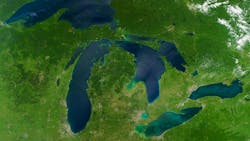The U.S. Senate passed the Great Lakes Restoration Initiative Act of 2024 on December 4, 2024.
The passing of the act will allow the federal government to continue investing in actions through 2031 to improve lake conditions including the cleanup of toxic pollution, restoration of fish and wildlife habitat, reducing runoff pollution and combatting invasive species.
The next step will be for the U.S. House of Representatives (House) to review and pass the bill.
“We applaud the Senate for passing this bill, and we urge the House to act with urgency to ensure the nation maintains its commitment to protect and restore drinking water source for more than 43 million people,” said Laura Rubin, director of the Healing Our Water-Great Lakes Coalition, in a press release. “Federal Great Lakes restoration investments have been producing results in local communities across the region, but serious threats remain. Increased funding for ongoing actions to protect our local waters is critical and will support the much-needed progress we’re making to restore the Great Lakes, thereby protecting our drinking water, public health, jobs and quality of life.”
If the House fails to pass the bill, the Great Lakes congressional delegation will have to start over due to a new Congress coming in January 2025.
The Healing Our Waters-Great Lakes Coalition heralded the bill, which provides an increase of investment $475 million annually in the Great Lakes Restoration Initiative (GLRI).
Congress has invested $368 million in the current year for restoration actions.
GLRI success
Highlights of the GLRI’s success according to the National Wildlife Foundation include:
- Over 8,100 restoration projects completed or currently underway.
- 8 million farmland acres have received assistance for nutrient management actions.
- Over 6,700 river miles have been cleared of dams and barriers.
- A greater than 3-to-1 return on investment, as revealed by a 2018 analysis.
- Seven Areas of Concern have been delisted and nine have completes the actions necessary for delisting.
- 113 beneficial use impairments have been addressed.
- Nearly 480,000 acres of habitat, including 72,000 acres of coastal wetlands have been enhanced, protected and restored.
About the Author
Alex Cossin
Associate Editor
Alex Cossin is the associate editor for Waterworld Magazine, Wastewater Digest and Stormwater Solutions, which compose the Endeavor Business Media Water Group. Cossin graduated from Kent State University in 2018 with a Bachelor of Science in Journalism. Cossin can be reached at [email protected].

